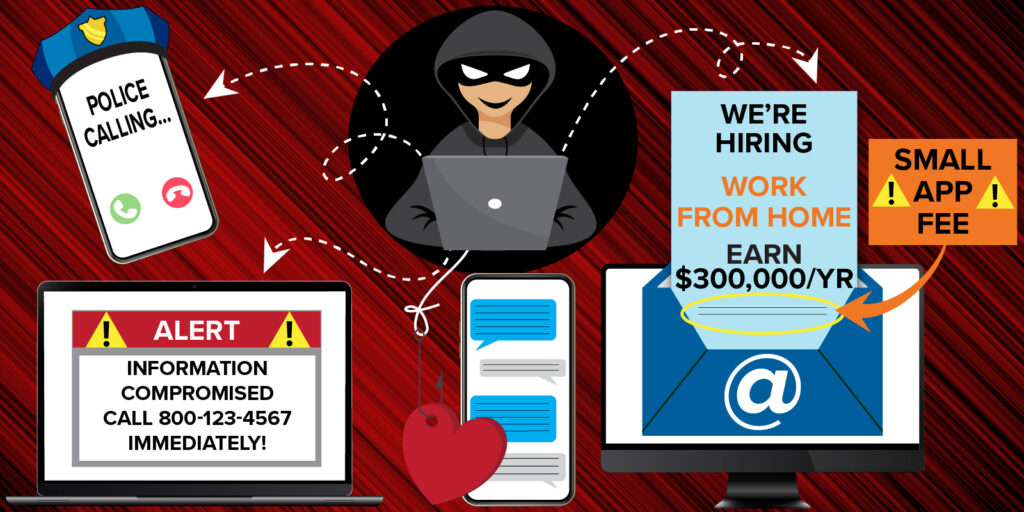
Don’t Fall for These Common Financial Scams
Every year, scammers come up with new ways to trick people out of their hard-earned money. Many of these scams seem harmless at first, a quick text, an online pop-up, or even a friendly message from someone you think you can trust. Below are some common financial scams, how they work, and what it feels like to be caught in one.
1. The “Dream Job” Scam
It starts with an exciting text or email: “We’re hiring remote workers! Earn $300,000 a year from home.” The message looks legitimate, with a professional logo and a link to apply. The only catch? A small application fee.
Example:
“I thought it was just a processing fee,” said Karen, who entered her debit card information to apply. “A few days later, I saw hundreds of dollars missing from my account. That small application fee turned into large charges.”
Tip: Legitimate employers never charge you to apply for a job. If it sounds too good to be true, it is.
2. Celebrity Romance Financial Scams
Scammers often create fake profiles using photos of celebrities or public figures. They build a relationship with their victim over time, expressing affection and trust before asking for money, often for “medical bills” or “travel expenses.”
Example:
“He told me he was filming overseas and couldn’t access his bank,” recalled Lisa, who believed she was dating a famous musician online. “When he said he needed help with medical bills, I sent him money. Weeks later, I found out it was all fake.”
Tip: Be cautious of anyone you meet online who asks for money, especially if you’ve never met them in person.
3. The Fake Tech Support Pop-Up
You’re browsing the internet when suddenly, a pop-up appears: “Alert! Your personal information has been compromised! Call this number immediately!” The pop-up looks official and alarming, so many people call, only to reach a scammer.
Example:
“The person on the phone said my bank account was hacked,” said James. “They told me to withdraw all my money and give it to them for ‘safekeeping.’ I didn’t realize it was a scam until it was too late.”
Tip: Never call numbers that appear in pop-up alerts. If you’re concerned about a financial pop-up message on your computer, or if you’re concerned about your bank account, contact your financial institution directly.
4. The “Government Official” Crypto Scam
Some scammers pose as law enforcement or government officials. They claim that your financial institution has “an inside job” and your money is at risk. The caller directs you to withdraw all your funds and deposit them into a crypto machine for “protection.” Once you do, the money is gone for good.
Example:
“They said they were from the FBI and that my bank account was being watched,” said Robert. “They told me to put my money into Bitcoin for safekeeping. By the time I realized it was fake, it was too late.”
Tip: No government agency will ever ask you to move or withdraw your money, especially into cryptocurrency. Hang up immediately and contact your financial institution.
How to Protect Yourself
- Think twice before clicking links, calling unfamiliar numbers, or sharing financial information.
- Verify the source. If you’re unsure, contact the company or agency directly through their official website.
- Report financial scams or suspicious activity to your financial institution immediately.
Anyone can find themselves involved in financial scams. Staying informed and cautious can help keep your money and identity safe.

